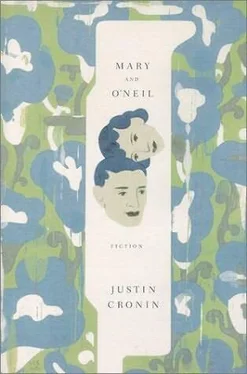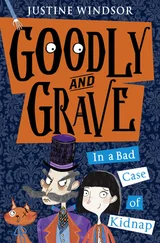The nurse was expecting him, the brother from Philadelphia; his sister was awake, she said, and waiting for him. She smiled with heavy lids when he entered the room. She wore a gown, of course, thin as a pillowcase, which embarrassed her; an IV was threaded into her arm. Someone was sleeping in the next bed, a dark form O’Neil glimpsed as he entered, shielded by a vinyl curtain. He helped Kay out of bed and into a robe, and down the hall to a small room where they could talk.
She had lost a breast to cancer eight years ago. There was some correlation, not well understood, between cancers of the breast and colon, and that was what was happening to her now. Fatigue, weight loss she welcomed at first and then worried over, some bleeding that she thought was hemorrhoids; it had happened slowly and then all at once, like anything. She hadn’t put all of it together, until two weeks ago. The cancer had moved outside the colon, she explained, into adjacent lymphatic tissues, though her liver and lungs were clear; that’s what the tests had shown. Her hair was grayer than the last time he’d visited, eight months before. In other ways she looked the same. He’d brought photographs of his older daughter, Nora, who was three, and baby Leah, just six weeks old, whom they called Roo; he brought a small CD player he’d purchased on his way out of town, and some disks for her to listen to: Bob Marley, whom she had loved in high school, Miles Davis’s Birth of the Cool, Sticky Fingers by the Rolling Stones. He told her that he had bought the last recalling a time, many years ago, when he had seen her dancing to “Brown Sugar” at a summer party. She was the big sister home from college and had smuggled him into a party at the house of friends, and he had stood in the kitchen doorway, a glass of warm beer in his hand, and seen her dancing. Why did some images stay with us that way, he wondered, arbitrary flashes of life seared into memory, while others vanished without a trace? Kay thanked him for the gifts, and when she said she was tired he walked her back to the room and kissed her good-night, the first time in years he had done this. I’m glad you’re here, she said sleepily, and squeezed his hand. The boys will be happy to see you.
It was late March, the sky sodden and gray. The mountains around the town were dolloped with white, and all the cars on the streets had ski racks. O’Neil slept on a foldout in the den that had been Jack’s office before the divorce, and spent the days of his visit with his nephews-ice-skating, pizza, trips to the movies and the mall. The oldest, Sam, was fifteen, Noah twelve, Simon five. O’Neil did not think he would ever have a son, and he welcomed this time with the boys, especially Sam, who was the same age as many of his students and had grown into a boy of surprising sweetness and touchingly mature enthusiasms: the flute, which he played expertly, and Scouts, and helping with his younger brothers, especially Noah, who was autistic and required almost as much looking after as Simon. Evenings, after dinner, O’Neil returned to the hospital. The room was awash with flowers, cards, gifts. Visitors came and went constantly, mostly women but some men, even Jack’s colleagues at the college. It was hard for her to rest, but good to see she had so many friends. I have the most famous colon in the Lower Champlain Valley, she said. Everybody here knows everybody else.
The rule was, she had to pass gas; it would mean that everything was working again. This happened on the fourth day after the surgery. The boys were at a hockey game with their father, and O’Neil and Kay were reading the Sunday Times together. She put down her paper and frowned. Honey, she said, I do believe I farted, and laughed. How wonderful to see her laughing! He hugged her, kissed her. Pull my finger, he said. Like they were kids again.
Her surgeon said she could be released the next day. It seemed too soon, but Kay was determined. O’Neil offered to stay longer, to help with the boys until she was really well, but she would have none of it. “Don’t they need you back home?” she said. “Don’t you have classes to teach? I’m fine. I miss my boys, I want to get back to work. Go home.” He brought them with him the next morning and found her up and dressed and looking well. The flowers that had not wilted were boxed in their vases to be carried down, wedged into place with the books and magazines and cards and the photos of her sons and O’Neil’s daughters that she had kept on the table by her bed. The boys flew into her arms. “My babies, my babies,” she said. Light poured from her face. “Did Daddy do fun things with you? Did Uncle O’Neil? And look at you, Simon. So big, in just a week!” The little boy puffed with pride. He had his mother’s hair, his father’s nose, eyes that were completely his own, iridescent and knowing. She hugged them again, each in turn, and then together. “It’s so good to see you all.”
He wondered how they would manage. She would begin her chemotherapy in three weeks, once the surgery was completely healed; it would last six months, each round taking a greater toll on her strength. Jack lived in a small apartment on campus, and though he and Kay shared custody, the boys had never spent a single night there. How would she make sure the boys got fed, that the bills were paid on time, that the complex enterprise of a house with children did not collapse into chaos? Already, the effects had started to show: the boys were living on pizza and hamburgers, Noah had worn the same sweatsuit three days running, the bathrooms reeked of piss. One of the boys’ rabbits-there were three or four, O’Neil could never be sure-had wriggled under the wire of his hutch and left droppings all over the garage. Before he left, O’Neil did the only helpful thing he could think to do, scouring the house from top to bottom and washing a dozen loads of laundry. He was angry at himself for failing to do these things before, for letting Kay come home from the hospital to a filthy house.
He planned to leave that evening; he could drive through the night, go home to shower and see Mary and the girls for breakfast, and then go straight to school. He had already missed five days of teaching. His students would be behind in everything, happily bewildered by this unplanned vacation; it would take him at least a week to get them back on track. He worked all day on the house, then loaded his car after dinner and went to Kay’s bedroom to say good-bye. Noah and Simon were under the covers beside her, listening to her read from Treasure Island; Sam, lying diagonally at their feet, was listening with earphones to the CD player O’Neil had brought for Kay and punching numbers into a calculator, recording them on a yellow legal pad. All eyes rose as he entered the room.
“Kiss your uncle, boys.”
They did, even Sam, though he also shook O’Neil’s hand. Fifteen years old, O’Neil thought. Now you’re in charge. He bent over the bed to embrace his sister. She was wearing a flannel nightgown, and he felt, against his chest, the doleful space of air where her left breast had been. He couldn’t imagine having to go through such a thing more than once. Their parents had died, swiftly, together, years ago, when O’Neil was still in college; it was Kay who had carried him through that awful time. A piercing loneliness touched him, and he realized, with a start, that it wasn’t his parents he was thinking of, or even Kay. He was thinking of his wife and daughters. He longed to hold them in his arms.
“Will you be…?” he began.
“We’ll be fine,” his sister said merrily, “won’t we, boys?” and waved him out the door.
After that he flew: when she began the chemo in April, in mid-May when the worst of the sickness set in, again in early June when her white count crashed and she finally asked him-Would you come? For the boys? He flew on Fridays, always taking the same 5:00 P.M. flight and renting a car in Burlington so that she would not have to send someone to get him, and because an extra car was always helpful: trips to the grocery or hardware store, to her doctor’s, to Noah’s therapist-he was always driving somewhere. His glimpses of Jack were cordial and fleeting, always in doors or driveways, when one or the other was delivering the boys. The divorce, two years ago, had been amicable; as Kay explained it, Jack had simply drifted away, like a comet slipping into a progressively wider orbit. O’Neil believed her but also knew this wasn’t the whole story. Though no one had said as much, he could tell there had been other women.
Читать дальше












